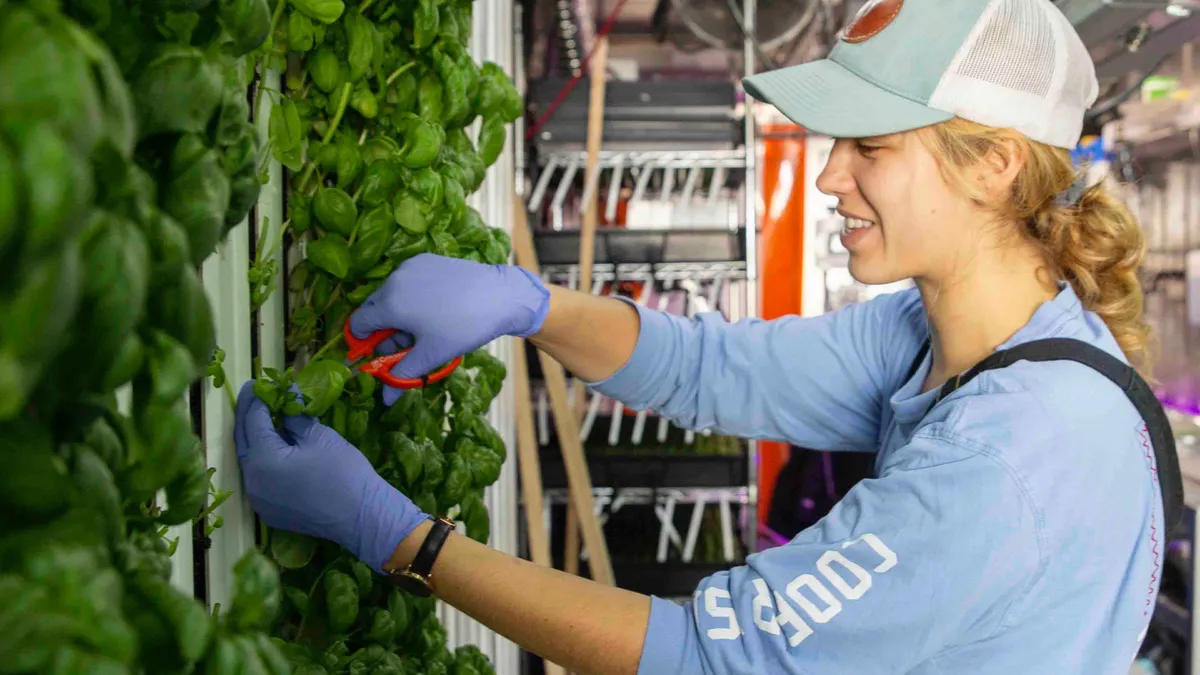Dive Brief:
- Square Roots, an urban indoor farming startup that grows greens and herbs inside shipping containers in Brooklyn, has announced plans to expand across the U.S. through a partnership with Gordon Food Service, a North American food distributor with several distribution centers and 175 retail locations.
- Under the partnership, Square Roots will build more of its indoor farming campuses at or near Gordon Food Service distribution centers and retail stores across the U.S. Produce from the farms will be available to Gordon customers. The companies did not specify how many locations will be established or where they’ll be located.
- As part of the expansion, Square Roots will also bring its Next-Gen Farmer Training Program to more locations across the country, teaching young adults about the company’s farming technology platform and training them as employees.
Dive Insight:
A recent report projects that vertical farming could be a $3 billion market in the next five years. With unpredictable weather conditions, land constraints and the ongoing need for more sustainable farming, indoor and vertical farming technology is gaining traction to satisfy the need for fresh, locally grown food around the U.S.
With Gordon Food’s network and Square Roots’ innovative technology and farming expertise, each partner offers something the other doesn’t have, creating a mutually beneficial partnership that will deliver locally grown food to more people in more places.
Square Roots says that its modular approach to farming requires less water and less outdoor space than traditional farms, and that means a lower cost overall. It also makes it possible to grow fresh food year-round, which will provide a steady crop for customers who seek fresh produce, especially in areas without farmers markets and traditional farming communities that can help supply local produce.
A few retailers have experimented with alternative growing methods over the last couple years. A Whole Foods location in Lynnfield, Massachusetts, operates a rooftop farm that is expected to yield about 10,000 pounds of produce per year, while Target has explored the possibility of indoor vertical farms to supply its own produce in stores. H-E-B introduced an indoor shipping container farm in 2017 at a Central Market store location in Dallas.
None of these retailers have deployed the concept on a larger scale — possibly because more companies have sprung up in the space and can provide the necessary supply — but it signifies the importance of locally sourced produce and how retailers are looking to offer more of it without, potentially, increasing costs.
Square Roots is in good company in the indoor farming space, with competitors often partnering with retailers and food distributors. Startup 80 Acre Farms recently secured funding to complete a 150,000-square-foot indoor farm in a suburb of Cincinnati, and packaged salad company BrightFarms is opening more of its greenhouses on the East Coast to continue supplying retailers with fresh produce.
The indoor farming space is getting more crowded, but demand growing for local, fresh produce in cities across the U.S. is also growing. Outfits like Square Roots can feed that demand, but retailers should do their due diligence to make sure any arrangement is sustainable from both an economic and consumer sentiment standpoint. Futuristic farming may not align with some shoppers' view of local, organic sourcing, as evidenced by a debate, currently simmering among the whole-health set, over whether hydroponics should be granted organic certification.













